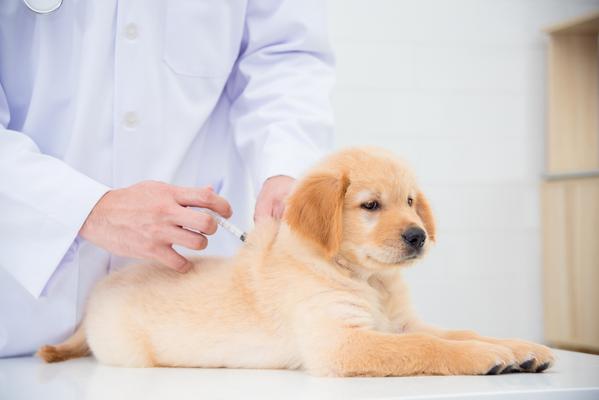
Just like humans, dogs need proper vaccinations to stay protected against various diseases. This protection is especially crucial in their puppy years in order to build up their immune systems. As a puppy owner, you may need to take your new pet to a vet regularly for puppy shots. Not exactly sure what puppy vaccinations your dog needs? We’ve compiled a comprehensive puppy vaccination schedule below.
What Shots Do Puppies Need?
Starting from their first year, your new puppy will need regular visits to the vet to schedule puppy shots. These vaccines prevent against diseases including:
1. Canine Distemper
This is a contagious disease that affects the nervous, respiratory, and gastrointestinal systems of dogs, skunks, raccoons, and others. The virus is spread by shared food, bowls, and water with an infected animal.
Once contracted, this virus discharges from the nose, eyes, and through vomiting, diarrhea, seizures, paralysis, twitching, or worse, death. Currently, there’s no permanent cure for canine distemper. However, there are vaccines your dogs can take to prevent the symptoms from ever happening.
2. Bordetella Bronchiseptica
This bacterium can cause vomiting, whooping, coughing, seizures, or even death.
Bordetella Bronchiseptica is one of the major causes of kennel cough. The vaccine against this bacterium is available in nasal sprays and injections.
3. Canine Hepatitis
This is a deadly viral disease that attacks the kidney, lungs, spleen, eyes, and liver of an affected dog. Symptoms typically range from pain, jaundice, vomiting, enlarged stomach, or even death.
While the disease has no cure, its symptoms can be treated with puppy vaccinations.
4. Canine Parainfluenza
This is one of the common viruses that is responsible for kennel cough.
5. Canine Coronavirus
This viral infection isn’t the same as the global strain, COVID-19. In fact, there is no evidence that suggests that COVID-19 affects dogs. Thecanine coronavirus is a disease that attacks the gastrointestinal system of young dogs.
Common symptoms include diarrhea, loss of appetite, and vomiting. Currently, there’s no cure for the virus. That’s why a schedule for puppy shots is encouraged.
6. Leptospirosis
This is a bacterium found in soil and water. It can be passed from dogs to humans. The common symptoms are usually jaundice, stiffness, muscle pain, infertility, lethargy, and kidney failure.
Your puppy needs to be vaccinated with effective antibiotics.





